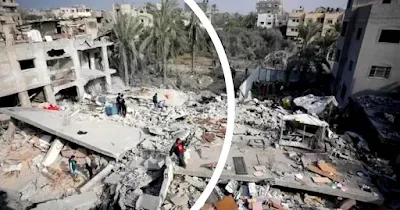"Plan B" that Israel has for the Gaza Strip
More than two months have passed since the Israeli government declared war on Gaza in retaliation for Hamas's offensive on its southern regions, which claimed the lives of over 1,200 people, the majority of whom were Israeli civilians. Many Palestinians, about one-third of whom were children, have been killed and entire neighborhoods destroyed by Israeli artillery and ground assaults.
The "eradication" of Hamas from the enclave has been the stated purpose of the Israeli assault, but analysts and foreign officials are beginning to doubt whether this will actually be possible. Rather, the extensive damage done to Gaza and the discussions inside the Israeli government suggest that the Israeli authorities may have another goal in mind.
 |
| "Plan B" that Israel has for the Gaza Strip |
According to reports, the document was composed for The Unit for Settlement - Gaza Strip, an organization that aims to recolonize the Gaza Strip 18 years after Israeli settlers and forces left it. The 2.3 million Palestinian residents of Gaza were compelled to move to the Sinai Peninsula in Egypt in late October, according to a document created by Israel's Ministry of Intelligence that was leaked to the Israeli media.
We do not, however, live in 1948. Currently, it is far more difficult to completely destroy cities and villages than it was 75 years of age ago, when Israeli militias drove a significant portion of the Palestinian inhabitants from their homes. At the time, the media's influence was also significantly less than it is today.
The new strategy is implemented by targeting civilian infrastructure that supports life in the strip, including schools, universities, hospitals, bakeries, shops, farmland and greenhouses, water stations, sewage systems, power stations, solar panels, and generators.This is carried out in parallel with a full siege on Gaza, whereby food, water, electricity and medicine have been cut off. The Israeli army lets in a few trucks a day, if at all, which humanitarian organisations have said does not meet at all the needs of the Palestinian population, 1.8 million of whom have been internally displaced.
Making sure that Egypt and other neighboring nations are prepared to "absorb them" is the next stage once the Gaza Strip becomes uninhabitable and its people are forced to flee voluntarily. According to Giora Eiland, the former chairman of the Israeli National Security Council, "severe epidemics in the south of the Gaza Strip will bring victory closer." Several well-known Israelis, like Ram Ben Barak, the former deputy head of Mossad, the country's intelligence organization, have made this evident.
"To build a coalition of countries and international funding that will allow Gazans who want to leave to be absorbed [in those countries] through the acquisition of a citizenship," Ben Barak stated in a Hebrew-language tweet.
In a letter dated November 12, 1914, US President Woodrow Wilson stated that "Segregation is not humiliating but a benefit, and ought to be so regarded by you gentleman." Wilson was a supporter for racial equality. Similar language is used to describe Israel's strategy, which is more closely related to ethnic cleansing than segregation and was developed more than a century ago. "An opportunity [for Gaza residents] to escape the reign of fear of Hamas, which uses them as human shields," according to Ben Barak, is what the exodus represents.
Of course, it is ironic that the Israeli army frequently uses Palestinian citizens as "human shields." However, in addition to the focus on "voluntary" departure in this "benevolent approach," it is also made more acceptable
The 156,000 Palestinians (as well as their descendants) who were able to stay inside Israel's boundaries after 1948 have long been referred to by Israel as "Arabs," depriving them of their Palestinian identity. There are 22 country states among Israel's Arab population, as Prime Minister Benjamin Netanyahu famously asserted. They are not in need of one more. It is crucial to emphasize that calling the people living in these areas—from the Strait of Gibraltar to the Strait of Hormuz—“the Arabs” would be equivalent to calling all people living in South Africa, the United States, Canada, Australia, New Zealand, Ireland, and Britainthe English,” regardless of where they were born. Despite speaking the same language, they have distinctly different histories, customs, and identities.
The Jerusalemite geographer al-Muqaddasi (946–1000) articulated his identity as a Palestinian in very precise terms over a millennium ago. "I brought up the building in Palestine to them [the Shiraz workers], and we talked about these things. Are you Egyptian, as the master stonecutter inquired? "No, I am Palestinian," I retorted.
The Arabic-language journal Falastin issued an editorial on September 3, 1921, pointing out that "We are Palestinians first and Arabs second." This was centuries later. These are only two of the numerous textual texts where the term "Palestinian" is used unambiguously to indicate identity.
The fact that Palestinians are more than just "Arabs" becomes even more apparent when we consider the years that Jordan occupied the West Bank (1948–1967). During this time, the local populace, led primarily by Fatah fighters, fiercely opposed the occupation, to the point where King Hussein felt compelled to declare martial law.
During the same time period, Palestinians in Gaza, which was ruled by Egypt, endured severe persecution, were refused citizenship, and had very little influence over local governance.
After being driven from communities around the Gaza Strip by Israeli militias, the majority of them lived in appalling conditions, mostly in camps for refugees, including Huj, Najd, Abu Sitta, Majdal, al-Jura, Yibna, and Bayt Daras. The three Hamas founders, Ahmed Yassin, Abd al-Aziz al-Rantisi, and Ibrahim al-Yazuri, were banished from these final three communities in particular together with their families while they were young. These days, the neighboring nations that Israel is seeking to take in the Palestinians are fiercely rejecting not just the Palestinians' wholesale evacuation from Gaza and maybe the West Bank.
The opinions presented in this piece are the author's own and may not accurately represent the editorial position of Al Jazeera.




